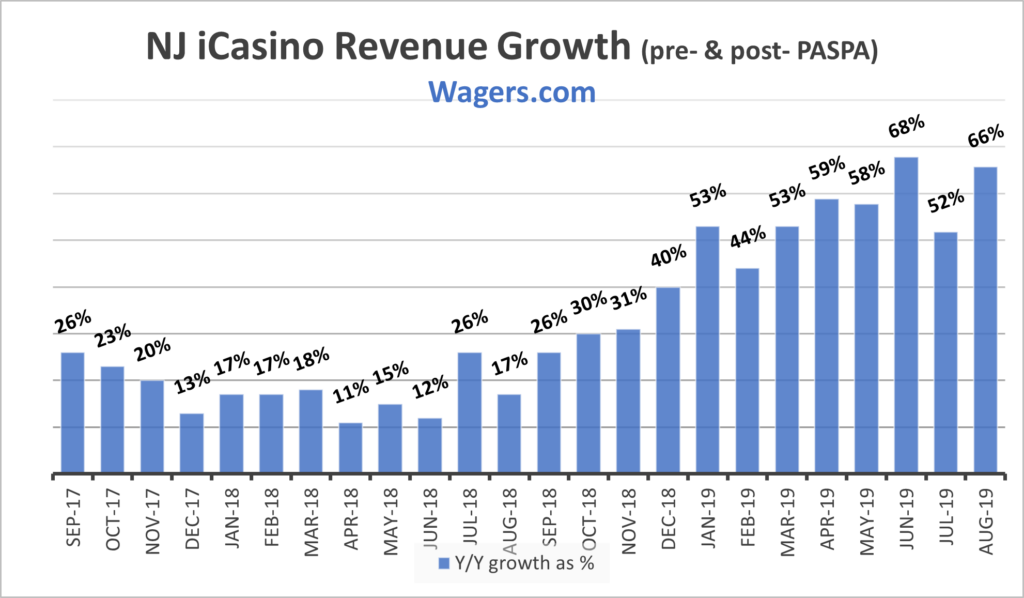Since 2014, Rutgers University has released an annual report on online gambling in New Jersey. The comprehensive analysis derives from “raw data files, collected by the Division of Gaming Enforcement (DGE) from all the operators” in New Jersey. Due to the nature of the study, the research is several years behind, but the unique insight from the exclusive data is worth its weight in gold.
The most recent report was issued in 2021 and dealt with Calendar Year 2018. That is an all-important year in the history of online gambling in the Garden State; it’s the first year with mobile sports betting.
Cross-Sell Is Real, and it’s Spectacular
There was no denying a solid amount of cross-selling between mobile sports betting and online casinos. New Jersey online casino revenue ballooned soon after the introduction of mobile sports betting in August 2018.

The Rutgers research helps explain that bump through the lens of new and active accounts. Remember that mobile sports betting began in August; otherwise, the expected new account number would be much higher and likely will when the 2019 data is released.
New accounts:
- 2016 – 155k
- 2017 – 268k
- 2018 – 487k
Active accounts:
- 2016 – 94,021
- 2017 – 115,778
- 2018 – 125,270
Interestingly, only 13% (64,292) of the new accounts in 2018 were active users, which is a marked decrease from 2017, when 21% (57,549) of the 268k new accounts were active bettors. Still, 13% of 487,000 is more than 21% of 268,000, resulting in 10.5% more new bettors in 2018.
Growth has slowed to pre-PASPA levels recently.
Will New York Stunt New Jersey’s Online Gambling Industry?
Thus far, there’s no measurable impact on New Jersey’s online betting revenue following the introduction of mobile sports betting in New York. However, as the Rutgers research indicates, there is a historical impact lag following a significant structural change to gaming in a state or region.
New York is just a few months into its life as an online sports betting state, and the impacts are unlikely to make their presence felt this early in its lifespan – nor do we have the raw data from either state to correctly measure the impact.
What we will learn over time is how many New York bettors ceased their trips to New Jersey and how many of those sports betting day-trippers were engaging with online casino games during their time in the Garden State.
VIP Bettors Should Be a Cause of Concern
A constant in the Rutgers’ reports is a focus on the top 10% of bettors, based on frequency and intensity.
Game selection among the top 10% is increasingly becoming casino-focused. It found that 87% of the top 10% group were casino-only players. Between 2014-2017, the casino-only group fluctuated between 61%-77%.
The good news is the annual amount wagered decreased by 10%, the first time Rutgers has seen such a reduction in the history of these reports. The bad news is the average amount wagered among this group was $582k. That is 28-times the amount the average gambler wagered, as the median amount wagered among the top 10% was $264,000 compared to the $645 the average bettor wagered throughout 2018.
Looking at total betting days also paints a good picture of how much the top 10% differ from the typical bettor. According to Rutgers, the top 10% of bettors averaged 222 betting days while the average gambler averaged 19.
Not surprisingly, the report concludes with four recommendations to enhance responsible gambling policies in New Jersey:
- Recommendation 1: Develop a uniform platform and requirements for self-exclusion across all gambling activities in the state.
- Recommendation 2: Develop an early warning system to inform players about their play and expenditures, featuring a uniform player information display (PID) for use across games and operators.
- Recommendation 3: Promote and incorporate standardized Responsible Gambling (RG) education and features at sign-up.
- Recommendation 4: Obtain and evaluate player feedback to guide future enhancements to RG.
